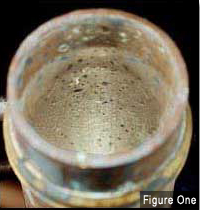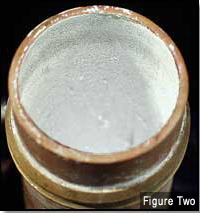Your basket is currently empty!
University of Bath Laboratory Trial
University of Bath Laboratory Trial
*These tests were performed in June 2000 on a Super Imp which is equivalent to our current WaterImp Original model. Since then we have continued our development and have introduced new and more powerful versions of all our electronic water conditioners whilst keeping the price the same.*
Figures 1 and 2 show two sections of piping after a 30-day trial conducted by the Department of Chemical Engineering at Bath University. The objective of this trial was to evaluate whether or not a Super Imp Limescale remover could reduce the level of scale formation within domestic hot water / radiator heating system.
Figure 1 shows a section of pipe from the system that had a Super Imp installed. The pipe looks exactly as it did when the experiment was started.
Figure 2 shows a section from the system without a Super Imp installed. Scale formation can clearly be seen on the inside wall of the pipe. Remember this is only after 30 days.


Photos © University of Bath IPU
The Experiment’s Conclusions:
The Super Imp device has been shown to reduce the deposition of scale under the conditions tested. This has been confirmed by analysis of both total dissolved solids and conductivity in parallel trials using a simulated domestic hot water / radiator heating system.
The Super Imp has prevented the deposition of about 10 mg of scale/day for 30cm length of 1 inch pipe under the conditions tested.
The Super Imp device has been shown not to effect the pH of water passing through piping where it has been installed.